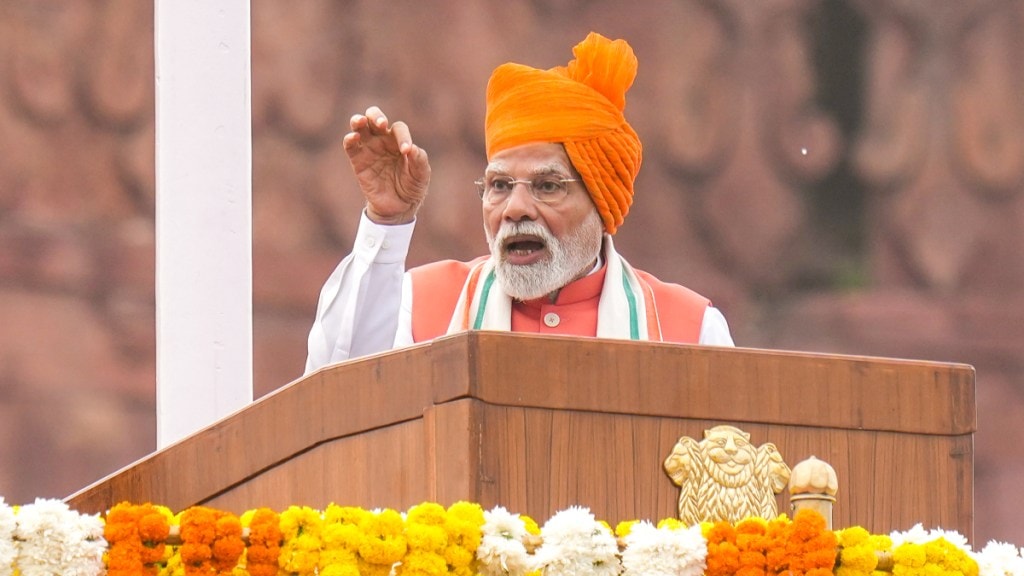Prime Minister Narendra Modi delivered a powerful Independence Day speech on Friday that packed in strong messages and big announcements. But what dominated his address was India’s ‘Atmanirbharta‘. The PM highlighted how the country has achieved self reliance in different sectors and can continue to do so with renewed focus on semiconductor production, energy sector and much more. He added that India will not compromise on interest of farmers and not accept any detrimental policies. The statement follows an apparent reference to Trump’s tariffs.
‘Atmanirbharta’ dominates PM Modi’s speech
Prime Minister Modi’s 12th Independence Day address focused strongly on ‘Atmanirbharta’. He highlighted achievements from building fighter jets in India to developing homegrown vaccines, and stressed that the country must reduce its dependence on others for essential needs.
He said that India should focus on making high-quality, affordable products, following the idea of “Daam kam, dum zyaada” to create a strong and self-reliant nation that lives up to the sacrifices of its freedom fighters.
In his Independence Day speech from the Red Fort, he cautioned that relying too much on others can weaken a country’s sovereignty and strength. He said dependence often turns into a habit, making people unaware that they have lost their self-reliance—a habit that carries serious risks.
Modi explained that self-reliance is not just about trade or currency; it is about a nation’s overall capability. When self-reliance fades, so does the country’s strength. Protecting and building these capabilities, he stressed, is the key to staying truly independent.
PM Modi on Semiconductors: ‘Working in mission mode’
Prime Minister Narendra Modi announced that India’s first locally made semiconductor chip will be available in the market by the end of this year. Speaking on the 79th Independence Day, he said the country is working on semiconductors at a fast pace, with six units already operational and four more recently approved.
“We are working on semiconductors on Mission Mode. By the end of this year, Made in India semiconductor chips, made by the people in India, will hit the market,” the PM said.
He noted that while the concept of a semiconductor factory in India was discussed 50–60 years ago, it was never implemented, causing the country to lose decades of progress in this field. Now, he said that with dedicated efforts, India is set to produce chips designed and made entirely by its own people.
PM Modi highlights India’s defence capabilities
Modi pointed to Operation Sindoor as proof of what self-reliance can achieve, saying that India’s ability to act swiftly came from its own defence capabilities. He also spoke of the need to develop India’s own fighter jet engines.
“Our enemies had no idea about the capability of ‘Make in India’, which weapons are simple and which are powerful enough to destroy them in a moment. Just think, if we were not self-reliant, would we have been able to carry out Operation Sindoor with such speed?” Modi said.
He also spoke about building a modern ecosystem in every sector, urging both the youth and government departments to work towards producing Made-in-India jet engines for fighter aircraft. While India is already recognised as the pharmacy of the world, he stressed the need to invest more in research and development so the country can provide the best and most affordable medicines for global welfare.
Mission Sudrashan Chakra
The PM also announced Mission Sudarshan Chakra, a next-generation weapons and surveillance program. The PM said that the mission will use advanced technology, including a Precise Target System and modern weaponry, to carry out high-accuracy strikes and handle complex warfare situations. The goal is to boost India’s readiness in the face of fast-changing global security challenges.
It is important to note that the announcement comes amid the fact that the US has delayed supplying GE engines for the Tejas Mk1A fighter jets, slowing production and raising concerns about the reliability of defence supply chains in India. While it was not the main focus of his speech, Modi’s push for making engines in India underlined a clear message, that the country will no longer tolerate dependence in key strategic areas.
The PM also announced plans to extend a national security shield to key public areas, such as railway platforms, hospitals, and religious sites, by 2035, ensuring protection beyond traditional military zones.
‘Clean energy 2025 target ahead of schedule,’ says PM Modi
On energy security, the PM said India is working to be fully self-reliant, with major projects in solar, hydrogen, and nuclear power. In just 11 years, the country’s solar energy capacity has grown 30 times, and new dams are being built to boost hydropower, he said. Modi noted that India has already met its clean energy target for 2025 ahead of schedule.
Modi puts spotlight on rare earth minerals race
The PM also highlighted the growing global competition for rare earth minerals, noting that these resources, once overlooked, have now become a top priority worldwide. He said India must be self-reliant in this area, which is why the government has launched the National Critical Mission, with exploration already underway at over 1,200 sites.
“What once received little attention has now come to the centre stage. For us as well, being Atmanirbhar in critical minerals is absolutely essential. That is why we have launched the National Critical Mission. Exploration campaigns are underway at more than 1,200 locations,” the PM said.

